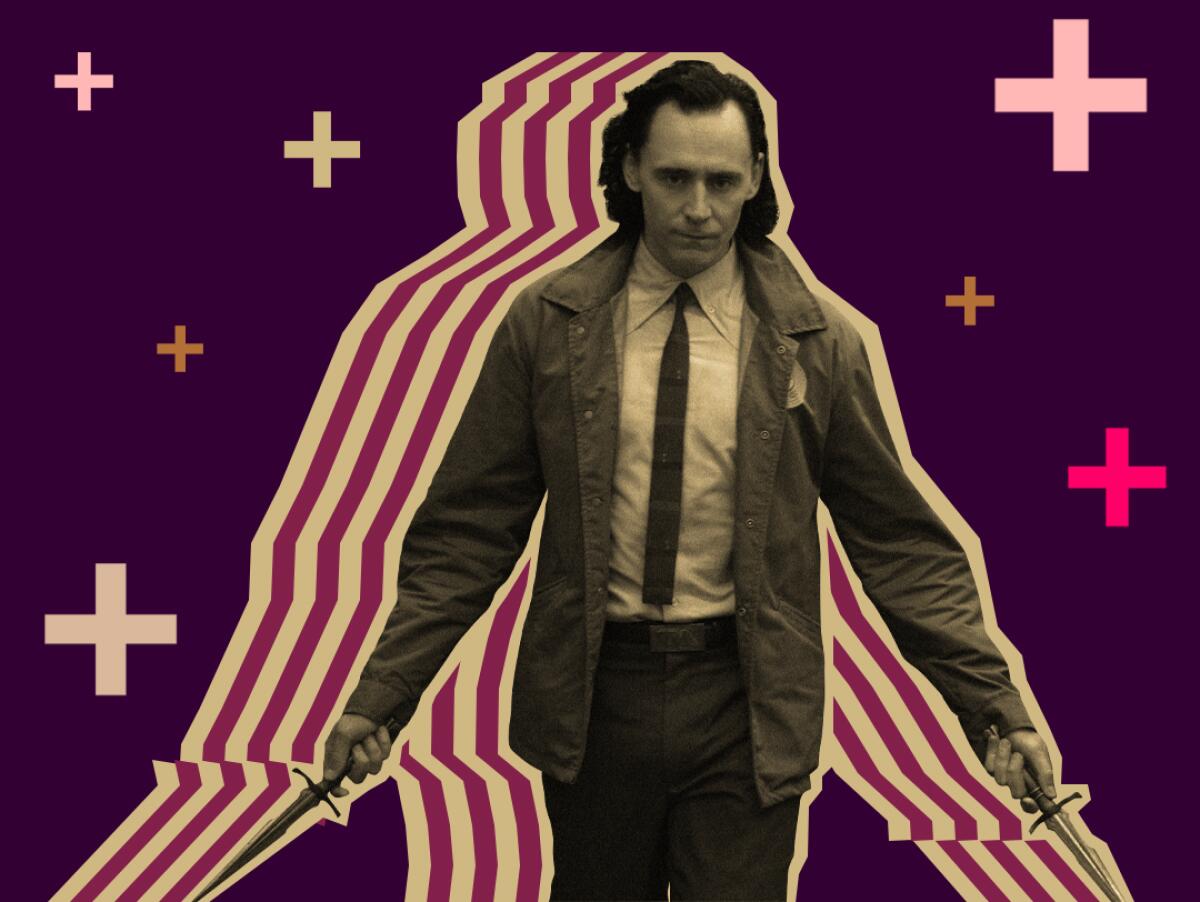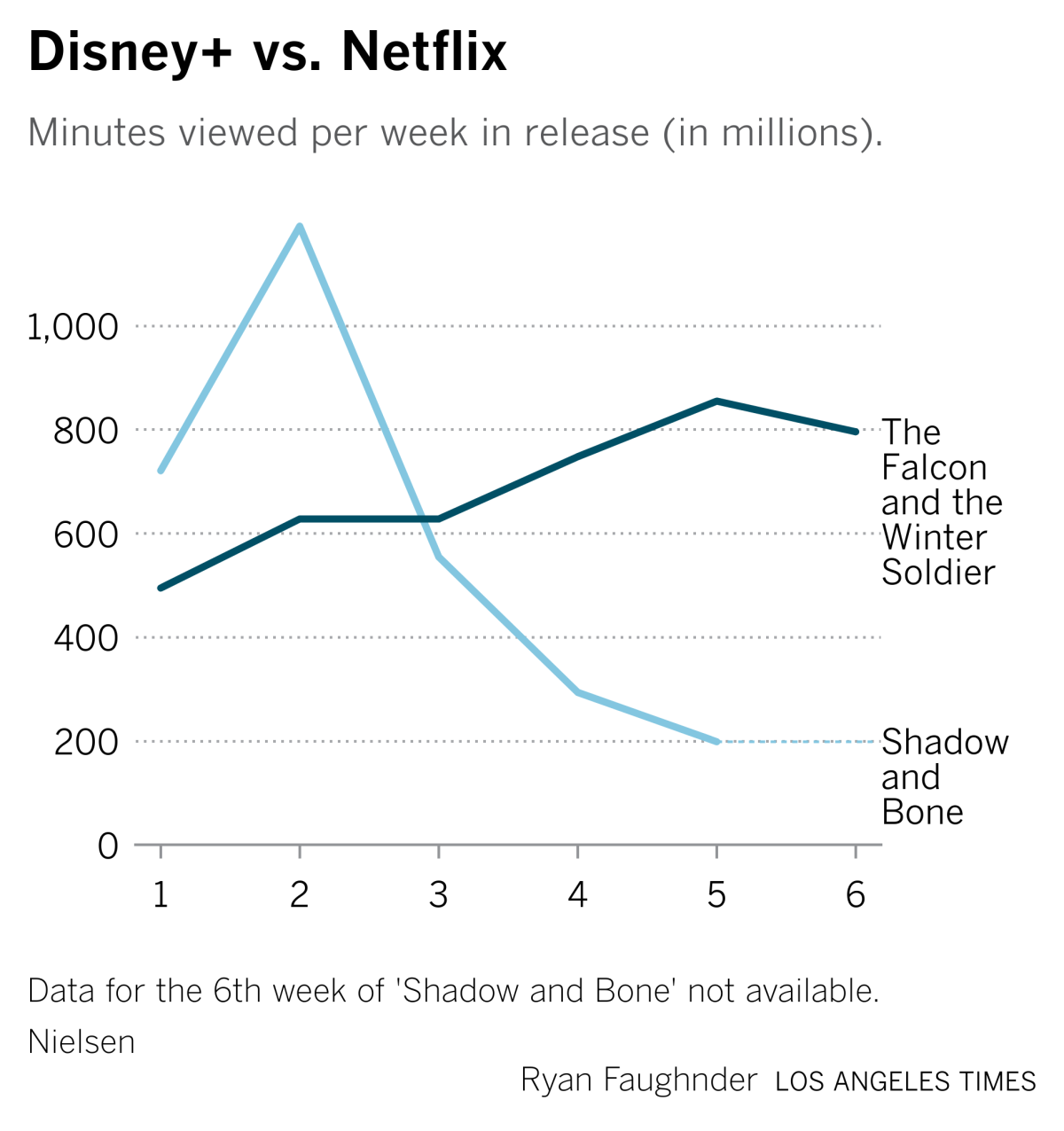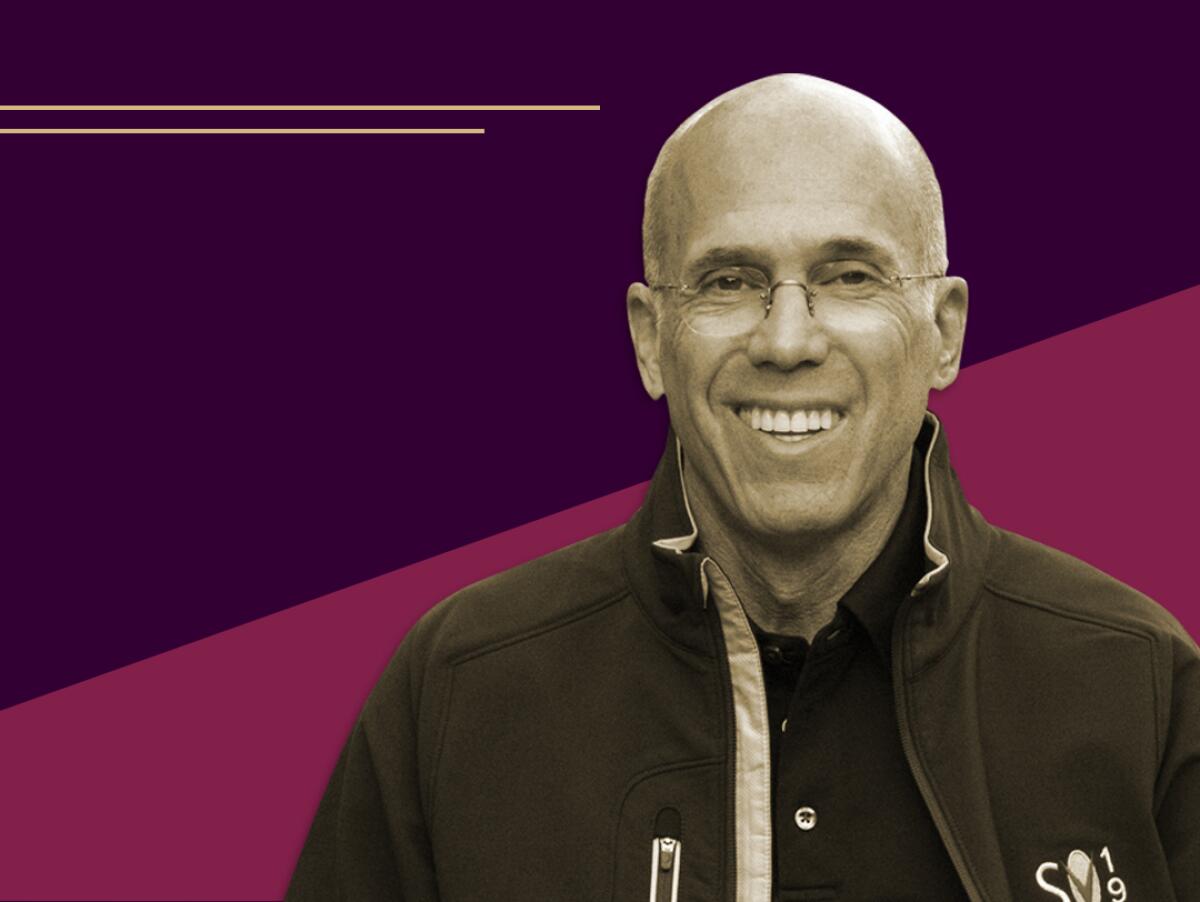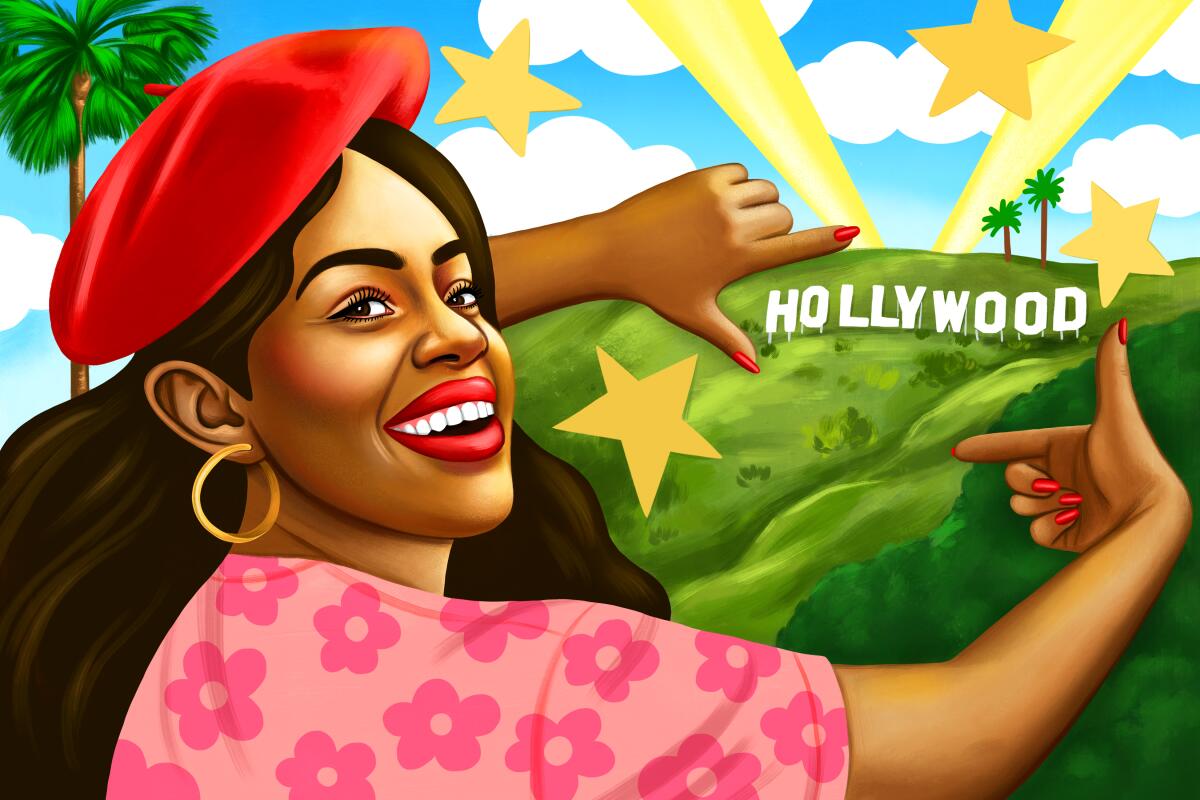Disney+’s ‘Loki’ shows why Marvel’s strategy could win the streaming wars

- Share via
This is the July 6, 2021, edition of The Wide Shot, a weekly newsletter about everything happening in the business of entertainment. Sign up here to get it in your inbox.
The weekly drops of “Loki” episodes on Disney+ have given me an affliction that, for lack of a scientific diagnosis, I’m calling “podcast brain.”
Inside the business of entertainment
The Wide Shot brings you news, analysis and insights on everything from streaming wars to production — and what it all means for the future.
You may occasionally receive promotional content from the Los Angeles Times.
Each of the four installments so far, with their time-warped connections to the Marvel Cinematic Universe and characters plucked from comic book obscurity, seem calibrated to send viewers rushing toward the internet’s trove of audio recaps and explainer articles (such as those by my colleague Tracy Brown).
For every episode of “Loki,” there are hours of additional content to consume, at 1.5x speed, from outlets like the Ringer and Vanity Fair.
And though podcast brain may be bad for anyone’s goals of improving mindfulness during the pandemic, it’s helpful for Disney+. It represents heavy engagement with the Marvel franchise, which is key to the studio’s strategy within Disney.
Because Disney+ doesn’t have Netflix’s bottomless supply of originals, it needs content that gets people excited to come back for more, particularly beyond Disney’s baseline market of parents who consider the animated vault a must-have.
That’s where “Loki” excels, as seen in data from third party firms like Parrot Analytics. Parrot doesn’t measure podcast listening, but it does calculate “demand” for shows by studying activity on social media, YouTube and sites such as IMDb and Wikipedia, which are similar examples of ways that people try to get the most out of their fandom.
Within seven days of its premiere, “Loki” had 89.9 times more demand than the average TV series globally, according to Parrot, making it the most “in-demand” show in the world. That doesn’t necessarily mean it was the most-watched show, but it does suggest that people are talking about it a lot online, and that counts for a lot.
The show is emblematic of how Disney’s strategy differs from Netflix’s. Disney releases one episode a week like a traditional TV network, while Netflix unleashes all the episodes at once for each season, with occasional exceptions.
Analysts love to debate which strategy is better. LightShed Partners’ Rich Greenfield, who prefers the Netflix way, argues that full-season drops help drive “addiction” on streaming, referring to the efforts of media companies to “capture as much time per day as humanly possible with the goal of getting users to come back every day (if not every minute).”
Netflix feeds addiction by spending otherworldly sums of money on content and encouraging people to binge its shows, allowing it to take up so much of people’s time that they won’t even consider dropping their subscriptions.
In contrast, Disney+ — and other streamers like HBO Max — make people wait for a week between episodes.
Theoretically, so-called appointment viewing creates more sustained interest in a show than if viewers could watch all six episodes in a couple evenings. The idea is that it generates more conversations around each episode. The argument in favor of this strategy reflects Disney’s ability to do what analyst Matthew Ball, in a recent essay, called “building love” for its franchises.
It works. According to Nielsen data, viewership for “The Falcon and the Winter Soldier” wasn’t the highest among streaming shows when it first premiered, ranking seventh overall during the week that ended March 21. But it tended to increase with each episode, eventually becoming the top show on Nielsen’s streaming charts in terms of weekly minutes viewed during the week of its second-to-last episode.
For comparison, take a hot Netflix show like “Shadow and Bone.” When the eight-episode series was released all at once in April, it was the third-most-watched show in streaming, according to Nielsen. It shot to No. 1 the following week, spiking to 1.19 billion minutes watched. But in its third week of release, it plummeted to No. 9 with 555 million minutes watched.
“The Falcon and the Winter Soldier” ended up with more total minutes viewed over the course of its run than “Shadow and Bone.” (The Entertainment Strategy Guy produces thorough analysis of weekly streaming ratings that I highly recommend nerding out with.)

The flash-in-the-pan element of Netflix’s programming is arguably part of its strategy. The idea is that once viewers are done with “Shadow and Bone,” there will be something else on the platform to watch right away because Netflix produces so much stuff.
Disney seems to get more sustained interest from each show, raising the question, how many Netflix shows is one “Falcon and the Winter Soldier” or one “Loki” worth?
In other words, how many “Lokis” will it take to match Netflix’s content lineup? It’s hard to say, especially because Nielsen doesn’t have data on “Loki” viewership yet, but probably more than Disney had originally anticipated.
The Mouse House has promised to dramatically increase the amount of shows and movies it makes for Disney+, recognizing the need for more content. Disney+’s subscriber growth slowed in the latest quarter, though so did Netflix’s. Disney may need to broaden its programming to reach more people, as noted in a report by the Information.
The Burbank company recently made a tactical move to release new episodes of its original shows on Wednesdays instead of Fridays. That should help it avoid direct competition with premieres on other streamers who tend to go out at the end of the workweek. It could also be a way to avoid cannibalizing the audience for Disney movies released on weekends, like “Black Widow.”
It’s not a huge shift, but it is a sign of how Disney is trying to capture more of the audience’s attention, whether you call that “love” or “addiction.”
Stuff we wrote

Jeffrey Katzenberg went on a “listening tour” about combating homelessness in Los Angeles... Benjamin Oreskes and David Zahniser report that the Quibi founder came to local politicians with a message, “according to three people who spoke with him: People are angry about what’s playing out on the city’s streets and want change.”
The Amazon-MGM deal is in Washington’s crosshairs, with Sen. Elizabeth Warren (D-Mass.) calling for greater scrutiny of the acquisition’s “possible anticompetitive effects” after reports that the FTC will review the transaction.
Separately, Amazon is asking that new FTC Chair Lina Khan, a prominent critic of the e-commerce giant, be recused from the agency’s investigation. Here’s some analysis of how this deal is becoming a politically charged whale.
Danny Trejo opened up to Daniel Hernandez in a great read about being typecast and having a close call with the Mexican Mafia.
Hollywood workers will have to wait longer to find out what COVID-19 safety conditions will be necessary on film sets this summer, reports Anousha Sakoui. An agreement over sick pay, testing, masking and other safety measures lapsed June 30 without a new deal between the Alliance of Motion Picture and Television Producers and leading entertainment industry unions.
Also, it was a huge week of legal news surrounding entertainment industry #MeToo stories.
— The New York City Commission on Human Rights fined Fox News $1 million over its sexual harassment and retaliation scandals.
— James Franco has agreed to pay $2.2 million to settle a lawsuit alleging sexual exploitation and fraud.
— And Bill Cosby is free after a court threw out his sexual assault conviction. Read Meredith Blake’s commentary on why the defense of the comedian offered by Phylicia Rashad, who played Clair Huxtable on “The Cosby Show,” is so infuriating.
The ‘no-BS’ guide to cracking Hollywood

The typical Hollywood aspirant knows making it in the business is about more than just finding an agent, signing up for an acting class and figuring out your side hustle, though of course it is about those things.
Especially for those just starting out, it’s also about knowing how to spot a scam posing as an opportunity and managing your mental health (which is pretty good advice for Tinseltown veterans too).
A team of Los Angeles Times journalists has launched the L.A. Times guide to entertainment industry careers, an ongoing project featuring stories that delve into the inner workings of the business for newbies, in what one of our editors describes as a “no-BS package” for folks trying to get their feet in the door. They include some usable pointers from people who’ve seen it all.
We’ll have more from this series in the coming weeks, but for now, check out the stories and please submit any questions or suggestions for issues our crew should address. Regular readers may have some of their own advice they’d like to share. If so, write to The Wide Shot.
More stories from the week
— Black-owned media collective Group Black Inc. launches to attract ad spending from marketers that are trying to diversify where they advertise. The company also intends to invest some proceeds in Black-owned media properties. (WSJ)
— The Directors Guild of America will no longer consider day-and-date releases for the top prize at its next DGA Awards, in a move that could shut out directors whose films will be released on HBO Max this year. What will Denis Villeneuve say? However, the Academy of Motion Picture Arts and Sciences will continue to consider day-and-date releases for the Oscars. (THR)
— Joe Rogan, podcast host and UFC color commentator, is too big to cancel. From the New York Times: “He’s now one of the most consumed media products on the planet. His Spotify deal, estimated at $100 million, speaks to the allure of making audiences feel they’re in on something subversive.”
— Also from NYT, Dan Schneider had once been called “the Norman Lear of children’s television.” By 2018, he was out at Nickelodeon. What happened?
Finally...

St. Vincent’s cover of “Sad But True” for the upcoming compilation “The Metallica Blacklist” sounds a lot like Trent Reznor, but Annie Clark’s guitar work takes it to another level.
Inside the business of entertainment
The Wide Shot brings you news, analysis and insights on everything from streaming wars to production — and what it all means for the future.
You may occasionally receive promotional content from the Los Angeles Times.




